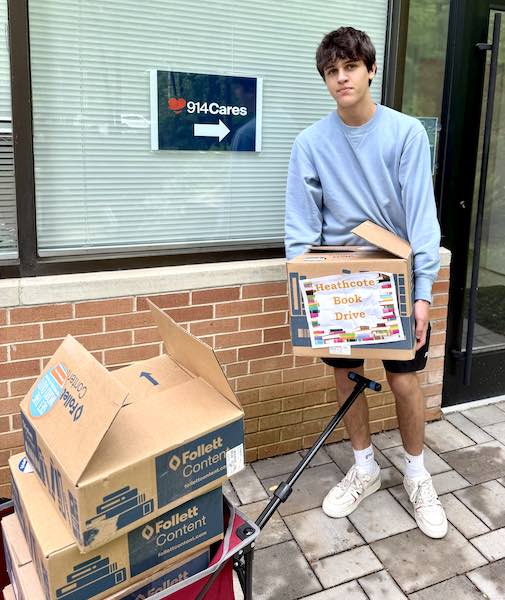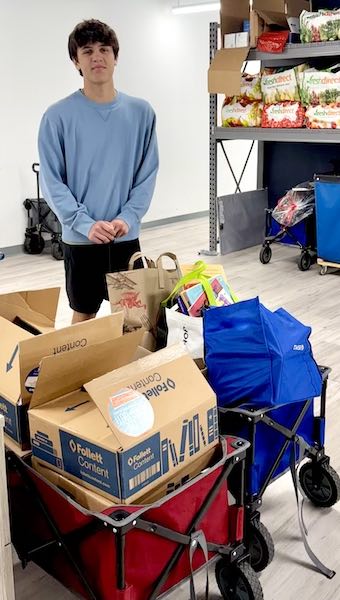Delivering Children's Books to Underserved Communities
- Wednesday, 04 June 2025 08:00
- Last Updated: Wednesday, 04 June 2025 08:00
- Published: Wednesday, 04 June 2025 08:00
- Joanne Wallenstein
- Hits: 2767
 At a time when, here in the U.S., educational programs are being systematically dismantled, it may give some folks solace to know that students like Max Spencer are taking tangible actions to provide educational tools to the most vulnerable in our larger community. As the son of an immigrant mother, the Scarsdale High School junior has long appreciated the diverse tapestry that makes up our country and the vast opportunities that exist here. Likewise, Max also greatly appreciates the access he has to an incredible education and the supportive community that comes with growing up in Scarsdale. Though grateful for the privileges he enjoys here, Max felt troubled by the socioeconomic disparity that can be found in Westchester and how it can impact a child’s educational experience. After learning that reading aloud to young children is strongly linked to pursuit of higher education and subsequent social mobility, Max started The Inspiration Project, a program that aims to inspire a love (and pursuit) of learning in children by providing free children’s books to families in need.
At a time when, here in the U.S., educational programs are being systematically dismantled, it may give some folks solace to know that students like Max Spencer are taking tangible actions to provide educational tools to the most vulnerable in our larger community. As the son of an immigrant mother, the Scarsdale High School junior has long appreciated the diverse tapestry that makes up our country and the vast opportunities that exist here. Likewise, Max also greatly appreciates the access he has to an incredible education and the supportive community that comes with growing up in Scarsdale. Though grateful for the privileges he enjoys here, Max felt troubled by the socioeconomic disparity that can be found in Westchester and how it can impact a child’s educational experience. After learning that reading aloud to young children is strongly linked to pursuit of higher education and subsequent social mobility, Max started The Inspiration Project, a program that aims to inspire a love (and pursuit) of learning in children by providing free children’s books to families in need.
We recently sat down with Max to learn more about The Inspiration Project and how he hopes this important work will make a difference.
Q: Can you tell us more about your project?
A: I have been doing childrens' book drives within our larger community and donating the collected books to specific underserved populations. I have started within Scarsdale and have collected many books due to our community's generosity, but I plan to expand much further. I'd like to collect childrens' books that are no longer needed (refreshing library content, children growing too old for the books, etc.) and deliver them to community groups where this specific item (childrens' books) could easily be overlooked. There are many people who are working hard with more basic needs, so books are something that wouldn't necessarily be prioritized, but it could have a significant impact on their kids' futures. I have already provided books to 914 Cards and Hearts and Home for Refugees.
I'm targeting refugee and underserved immigrant populations to the extent that I can. I have an interest in working specifically with immigrant communities because of my own family story and experiences growing up. I'd like to donate books to specific refugee and immigrant centered organizations, but I've collected more books than these communities want to take right now, so I've expanded donation options to a few local child-oriented community organizations who have a greater need for childrens' books. I’ve also connected with Too Small to Fail, a program with The Clinton Foundation focused on childhood literacy, and am hoping to work with them this summer to find appropriate community partners to further my goals and theirs.
As an additional step within this project, I also hope to write and illustrate my own childrens' book this summer, publish it, and donate all sales proceeds to immigrant-oriented organizations. My book will be fictional, but will be inspired by stories of actual immigrants I know within my community.
Q: What inspired you to want to do this sort of work?
A: One of the biggest drivers of real economic change for individuals is pursuing higher education. There are many systemic barriers to this within underserved communities which need to be addressed, but one of them is having the motivation and desire to educate oneself through college. I got interested in this specific topic, because I do think there are communities where motivation is high, and others where motivation is low. So I began to research what drives motivation to pursue higher education, and I came across a presentation from the University of Chicago which cited early childhood literacy as one of the biggest components to the pursuit of future educational goals. Most parents love their children and want them to have good lives, but one of the things that might be different is the actual access to children's books. I can't address this problem on a large scale, but I do have the ability to put a few more childrens' books in a few more families' hands here in the NY area, and that is what my project is centered on. In a nutshell, this project combines my strong interest in immigration and immigrant populations and my desire for increased social mobility through access to education.
Q: Why is this work important to you? Is it personal for you?
A: As I mentioned above, my own family story and early childhood experiences are what inspired me to pursue this specific project, which is targeted towards immigrant communities in the NY area. I am the grandson of both immigrants and "natives" to America. My mom's parents came here in the 1970s and she was a first generation Indian American. My dad's family has lived in America for hundreds of years and many generations. But both sides of my family have a very strong respect for the concept of America as a place of hope for better life, no matter where you originate. This concept is under attack right now, which makes me feel even more inspired to work with immigrant populations, but I've always felt this way about immigration and America. Additionally, my first babysitter was a "Dreamer" - her family brought her here from Cote d'Ivoire when she was 2, and they were undocumented. She grew up as American as anyone else, but there were so many things withheld from her because of a situation over which she had no control. I was very close to her, and am still in touch with her, and although I didn't know much about her story when I was 4, I have learned it over the years and it has also been a big part of why I have this specific interest in immigration in America.
Q: How do you hope children and communities will benefit?
A: I think that while America does have real barriers to pursuing socioeconomic growth, it is still probably the country with the most access to opportunity. This is a concept that was also very much a part of what I was taught growing up. There are many things that aren't yet working perfectly in our country, but people generally are able to create real change in their lives in a more significant way than many other countries. I imagine that this is ultimately why so many people from around the world continue to want to immigrate here - they want to change their lives and know that it is possible in America. However, I do think people need to have that internal motivation to push themselves outside of the world they know, and this is why I decided to focus on early childhood reading. If early childhood reading can help kids want to pursue higher education, this will go a long way in helping them on the path to changing their socioeconomic outcomes. So I want to put books' in young kids' hands, and hope that that translates to an internalized belief system and desire for education.
Q: Do you hope to continue this sort of work in your future?
A: Yes. For now, my goal is small - I want to collect and distribute 3,000 books before I graduate (I've already collected just under 1,000 and have been pledged 400-500 more). I'm also hoping to raise at least $3,000 with the sale of my children's book on immigrant stories in my community. But I am very interested in pursuing some sort of continued work addressing these concepts of economic empowerment and immigration. I've already researched and written a paper on the economic impact of immigration in America (and Japan- it was a compare and contrast paper), and I'm in the process of getting it published. I'd like to take my research a step further this summer, if I have time and can find some sponsorship for it. I am very interested in immigration patterns, barriers, and motivations, and ideally I'll be able to continue this type of study once I get to college. I don't yet know how I can make an impact in this area with a career, but hopefully that will come to me as I get closer towards having a career.
Q: How can others get involved or help?
A: This is the most important question. If you are reading this and have children's books you'd like to donate, I will come and pick them up whenever is convenient to you, and I'll find a good home for them. Please email me [email protected] and I'll respond right away to get your books picked up and donated. If you'd like to get involved and help in any other way as well, please reach out. I'm just one person doing this, and the more people involved, the more impact we can have.






